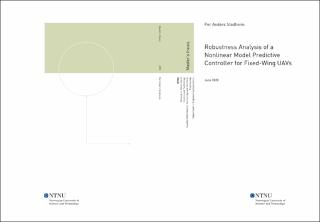Robustness Analysis of a Nonlinear Model Predictive Controller for Fixed-Wing UAVs
Master thesis
Permanent lenke
https://hdl.handle.net/11250/2780956Utgivelsesdato
2020Metadata
Vis full innførselSamlinger
Sammendrag
En av de viktigste bekymringene for en NMPC er evalueringen av kontrollerens ytelse i varierende miljøer, nærmere bestemt kontrollerens robusthet. Robusthet kan defineres som et biprodukt av kontrollstabilitet og muligheten til å håndtere ukjente model-forstyrrelser opplevd i sanntidsflyvninger. NMPC er en ikke-lineær kontrollmetode som systematisk evaluerer modellbegrensninger og en brukerdefinert kostnadsfunksjon, og til slutt finner en optimal inngangssekvens som utnytter den hurtige manøvrerbarheten til en UAV. Kontrollerenes prediktive evner er en direkte funksjon av modellbegrensningene og referansene. Hvis plantemodellen er utilstrekkelig, vil sanntidsytelsen lide. Noen av de største modellforstyrrelsene som påvirker en typisk UAV, kan være: 1) tilfeldig turbulens, 2) slitasje av systemet, og 3) isdannelse. Alle disse faktorene er tilfeldige, og ikke mulig å implementere i kontrollanleggsmodellen. En full offset correction NMPC algoritme er foreslått i denne oppgaven, som viser lovende teoretisk robusthet mot omgivelsesforstyrrelser. To kontrollere er testet med denne kontrollerarkitekturen, noe som styrker robusthetsanalysen ytterligere. Til slutt blir OCP-simuleringstidene for flere kontrollmetoder evaluert, og videre undersøkt muligheten for en sanntids-implementering. One of the primary concerns for an NMPC is the evaluation of the controller’s performancein varying environments, more specifically the robustness of the controller. Robustness canbe defined as a byproduct of controller-stability and the ability to handle unknown modeldisturbances experienced in real-time flights. NMPC is a nonlinear control method thatsystematically evaluates model constraints and a user defined cost function, ultimatelyfinding an optimal input sequence that exploits the fast manoeuvrability of a UAV. Thepredictive capabilities of the controller, are a direct function of the model constraints andthe references. If the plant-model is insufficient, the real-time performance will suffer.Some of the largest model disturbances affecting a typical UAV might be: 1) random tur-bulence, 2) wear and tear of plant, and 3) icing accretion. All these factors are random,not possible to implement in the controller plant-model. A full offset correction NMPCalgorithm is proposed in this Thesis, showing promising theoretical robustness regardingambient disturbances. Two attitude controllers are tested with this controller architecture,further strengthening the robustness analysis. Finally, the OCP simulation times of severalcontrol methods are evaluated, further investigating the possibility of a real-flight imple-mentation.
